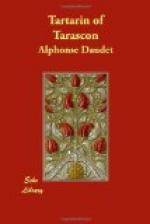Tartarin furnished all the elucidation desired. He had read “The Life of Jules Gerard, the Lion-Slayer,” and had lion-hunting at his finger ends, as if he had been through it himself. Hence he orated upon these matters with great eloquence.
But where he shone the brightest was at dinner at Chief Judge Ladeveze’s, or brave Commandant Bravida’s (the former captain in the Army Clothing Factory, you will keep in mind), when coffee came in, and all the chairs were brought up closer together, whilst they chatted of his future hunts.
Thereupon, his elbow on the cloth, his nose over his Mocha, our hero would discourse in a feeling tone of all the dangers awaiting him thereaway. He spoke of the long moonless night lyings-in-wait, the pestilential fens, the rivers envenomed by leaves of poison-plants, the deep snow-drifts, the scorching suns, the scorpions, and rains of grasshoppers; he also descanted on the peculiarities of the great lions of the Atlas, their way of fighting, their phenomenal vigour; and their ferocity in the mating season.
Heating with his own recital, he would rise from table, bounding to the middle of the dining-room, imitating the roar of a lion and the going off of a rifle crack! bang! the zizz of the explosive bullet — gesticulating and roaring about till he had overset the chairs.
Everybody turned pale around the board: the gentlemen looking at one another and wagging their heads, the ladies shutting their eyes with pretty screams of fright, the elderly men combatively brandishing their canes; and, in the side apartments, the little boys, who had been put to bed betimes, were greatly startled by the sudden outcries and imitated gun-fire, and screamed for lights. Meanwhile, Tartarin did not start.
XI. “Let’s have it out with swords gentleman, not pins!”
A delicate question: whether Tartarin really had any intention of going, and one which the historian of Tartarin would be highly embarrassed to answer. In plain words, Mitaine’s Menagerie had left Tarascon over three months, and still the lion-slayer had not started. After all, blinded by a new mirage, our candid hero may have imagined in perfectly good faith that he had gone to Algeria. On the strength of having related his future hunts, he may have believed he had performed them as sincerely as he fancied he had hoisted the consular flag and fired on the Tartars, zizz, phit, bang! at Shanghai.
Unfortunately, granting Tartarin was this time again dupe of an illusion, his fellow-townsfolk were not. When, after the quarter’s expectation, they perceived that the hunter had not packed even a collar-box, they commenced murmuring.
“This is going to turn out like the Shanghai expedition,” remarked Costecalde, smiling.
The gunsmith’s comment was welcomed all over town, for nobody believed any longer in their late idol. The simpletons and poltroons — all the fellows of Bezuquet’s stamp, whom a flea would put to flight, and who could not fire a shot without closing their eyes — were conspicuously pitiless. In the club-rooms or on the esplanade, they accosted poor Tartarin with bantering mien:




